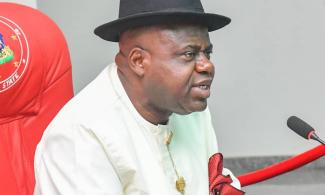
Diri noted that Gumi had become somebody no one could touch, adding that it was very unfair.
Governor Douye Diri of Bayelsa State has questioned why the President Muhammadu Buhari government arrested a leader of the Indigenous People of Biafra, Nnamdi Kanu, and did not pick up a renowned Islamic cleric, Sheikh Ahmad Abubakar Gumi, over his alleged link to bandits.
The Governor said this on Tuesday, when he featured as a guest on Channels Television breakfast current affairs programme, Sunrise Daily, where he noted that Gumi had become somebody no one could touch, adding that it was very unfair.

Diri said, “Two things I have to say; first, they should give him [Nnamdi Kanu] a fair hearing so that the trial will not be done in a way that everyone (especially the Igbo) will see it as oppression.
“Second, as we talk about the IPOB, what about the boys (bandits and herdsmen) organising killings in the North and in the whole country? What of Sheik Gumi? He has become somebody no one can touch. That’s very unfair.”
Gumi had recently warned the government against the killing of bandits, insisting that the criminals were victims too.
The Islamic scholar insisted that no school was safe in the North West for now until the government negotiated with the bandits.
His recent statement has raised questions of his involvement with the bandits and why the Buhari’s administration has failed to summon him for questioning.
SaharaReporters had on June 29 reported that the Attorney-General of the Federation and Minister of Justice, Abubakar Malami, listed the allegations against Nnamdi Kanu, saying he must continue his court trial in earnest.
Malami had in the text of his press conference, noted that the IPOB leader, apart from jumping bail, has been "accused of engaging in subversive activities that include inciting violence through television, radio and online broadcasts against Nigeria and Nigerian State and institutions."